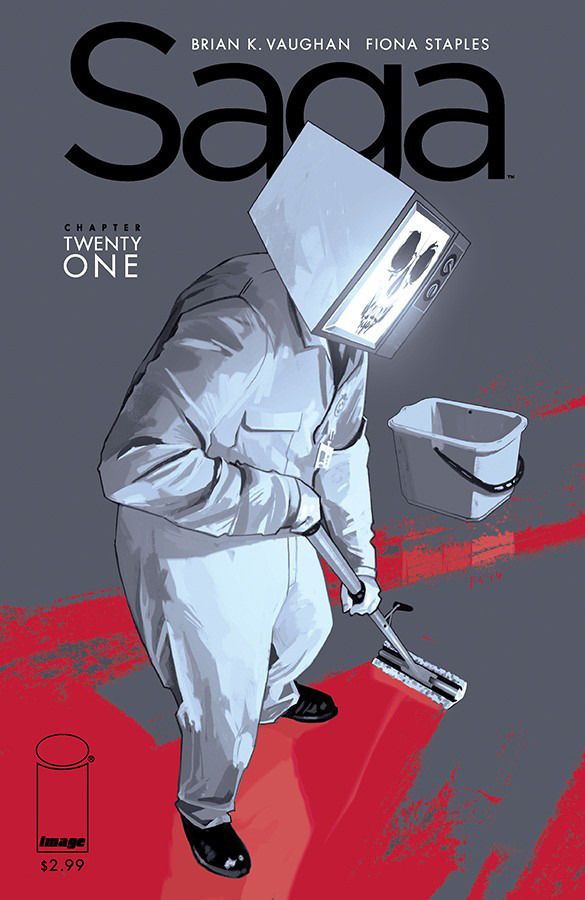Brian K. Vaughan and Fiona Staples' "Saga" #21 endeavors to take heartbreak to new heights as they continue their exploration of the disintegration of family in both subtle and decidedly unsubtle ways.
"Saga" #21 is another mostly quiet but absolutely devastating issue for Marko and Alana as the impending doom of their once deliriously happy marriage wreaks more emotional havoc than I would have thought possible. It's some fine comic book storytelling when nothing has to happen to a couple except the slow eventual disintegration of a love story and you still walk away feeling absolutely devastated.
Ingeniously, Vaughan has taken these characters and -- in just the last few issues -- showed readers that the biggest challenge they face isn't their wanted criminal status (with many freelancers hunting them), but rather, life: just the natural drifting apart of souls, the depression and loneliness of daily struggle, and the mundane everyday temptations that drive people apart. It's gut wrenchingly sad, and glorious.
Sure, other things happen in the book: Prince Robot's son's kidnapper goes on an impressive killing spree, Prince Robot finds out his wife is dead and his son kidnapped, he kills brothel madam Mama Sun for keeping this news from him, and he makes a call to dad (King Robot!) so he can begin some serious ass kicking, but it's all the devastating themes of family and loss, even in that more violent plot driven section of the book, that hit the hardest. It really solidifies that the themes of Saga are about family. Marko and Alana have been the obvious family since day one, but all threads and stories lead back to that same place.
For her part, Staples continues to bring these characters to spectacular life, as every line contributes to vivid -- almost breathing -- characters. Hazel is adorable, Marko and Alana are somber and desperate, the violence of Prince Robot is shocking, which all melds together into a perfect symphony of comic book excellence. Staples has always excelled at character design, storytelling and expression work, but her work feels stunningly effortless here -- almost matter-of-fact, in the best possible way. This isn't an issue (or generally a book) about "groundbreaking" storytelling conventions. There aren't weird panel layouts, double-page spreads or innovative panel breaking; it's just solid traditional storytelling with a focus on emotional beats and consistency. It's beautiful, and a reminder that sometimes the most important thing is making an audience care -- not impressing them with fancy tricks or stunning visual feats, but just getting to the heart of what makes a story tick. Staples does this with ease, and all while drawing a gorgeous book.
The word "saga" might imply to some readers a large bombastic story, but some of the dictionary definitions are simply "a long, involved story" and a "series of incidents" and Vaughan and Staples interests seem to lie at the definition's heart. They are interested in tiny, intimate stories that connect beautifully into a larger and more epic picture, all of it having a connected and universal meaning, that is also manages to be highly personal. Or perhaps I'm just reading too much into everything as I continue to reel from the emotional one-two punch of ongoing heartbreak at their magnificent hands.

